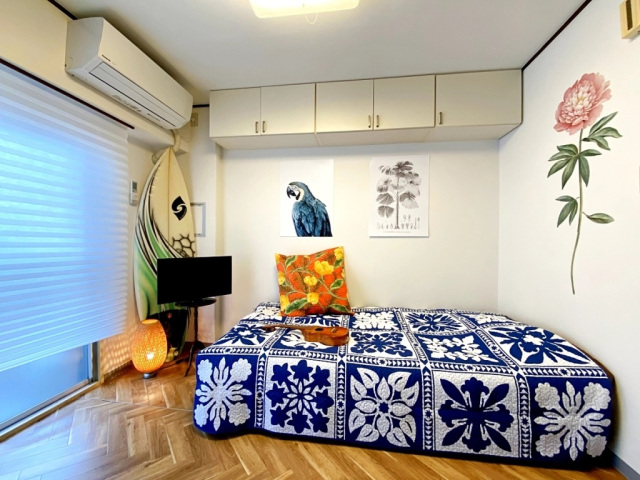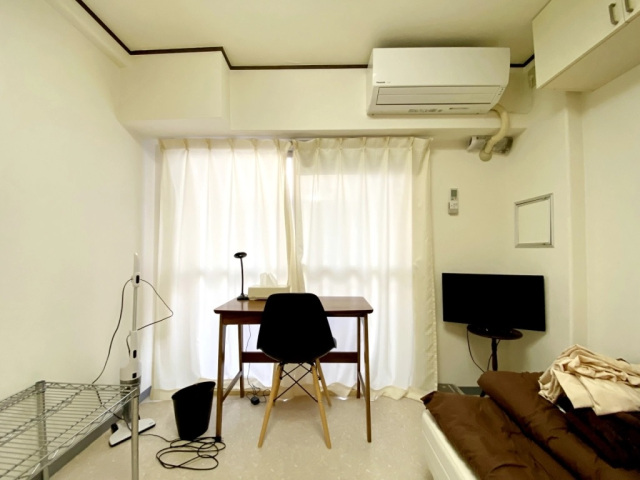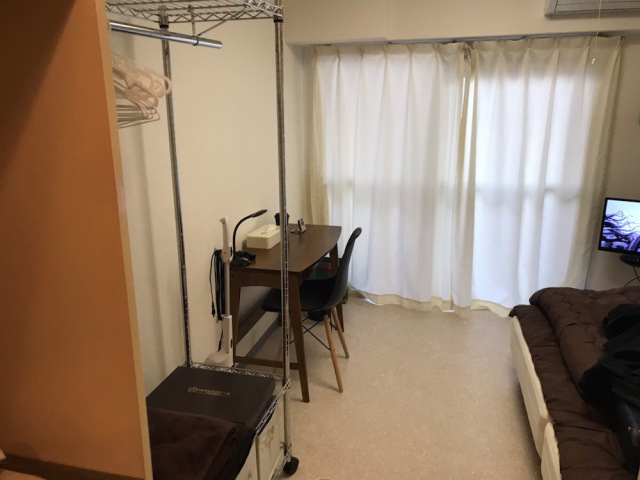
Firsthand account reveals there are pros and cons to catching the virus in a communal living environment.
Rents can be expensive for people wanting to live in the middle of a big metropolis like Tokyo. That’s why a lot of young people decide to move into “share houses“, which offer private, single-room accommodations with shared facilities at much more reasonable prices.
Strangers under one roof enjoying the perks of communal living sounds like the perfect setting for a hip TV drama, but it’s not always as great as it may seem. Especially now with the pandemic, it’s not an ideal time to be living with a group of strangers, and we spoke to one 30-year-old man currently living at a share house in Tokyo who had to deal with the worst-case scenario, when someone in his building caught, and spread the virus.
Thankfully, there were only two other men living in the share house at the time, so it wasn’t a large cluster, and while the challenges they faced proved to be difficult, they actually found there were silver linings to their situation as well.
Let’s take a look at his account below.
First of all, please tell us about your share house history.
“It’s a little confusing, but before the pandemic, I lived in a share house with about 60 people. However, when the company I work for bought an office and a share house, myself and two men from work started living at the share house, in Tokyo’s Shinagawa Ward.”
I see.
“Because it’s both an office and a share house, there are two other employees who come and go in addition to the three of us. All up, including my previous accommodation, I’ve been living in share houses for about two-and-a-half years.”
Were you worried when the coronavirus started spreading in Tokyo?
“Yes, I was. But everyone was very careful. As much as possible, we tried not to share the facilities at the same time as each other, and we often worked in our separate rooms without going to the office. Because we knew it would spread if one of us got it.”
I see.
“Because we lived with a sense of caution, we managed to make it through the first year without getting infected. But…in August 2021 one of my housemates tested positive for coronavirus.”
Really?
“He had been vaccinated once, but that didn’t matter. It spread fast from there. The other four of us, myself and the employees who went in and out, tested positive for coronavirus. Everyone at the share house had it all at the same time. It became a corona house (laughs).”
Wow. I guess if you don’t laugh about it, you’d cry.
“Yeah. At that time, the health centre was flat out, so there was no contact tracing of close contacts by the Ward. We did all the PCR tests ourselves, but I didn’t have many symptoms.”
That was fortunate. What do you think the reason was for the cluster, despite the fact that you’d all done so well to avoid getting infected for such a long time?
“Well, one reason may have been because we became relaxed. I started going out a little bit… I think it’s true to say that I became complacent in the second year.”
I see. I think there’s a tendency for that to happen, even outside of shared housing. Because the number of cases has been increasing regardless of the state of emergency.
“That may be so. Another factor is the power of the Delta strain. As I mentioned earlier, it wasn’t too severe for me, but the other two had a high fever in the 39-degree-Celsius range for about 10 days. I was really sorry to see it because they couldn’t find a doctor that would accept them and they couldn’t be hospitalised.”
Well, did you stay in the share house the whole time?
“Yes. Those of us who were a bit better than the two with the high fevers helped to look after them. Well, even though I say I was better, I had a 38-degree fever (laughs).”
I see. But it might have been good that you were sharing, given that some people have died as a result of having to deal with the infection at home alone.
“That’s right. It may have been a far more encouraging environment than being alone.”
One last question. What do you think of share house living in light of your experience with that cluster?
“I personally like share houses. I think there are many benefits to being able to live on the cheap by sharing things like home appliances. But above all, it’s nice to have someone around. When you order pizza, or watch the Olympics, it’s like you have another family. And there’s a sense of security when something happens, not just with the pandemic, but in everyday situations too.”
I see. Thank you very much.
After listening to this firsthand account of living with the coronavirus in a share house, we became more acutely aware of just how infectious the Delta strain is. Once one person in the building came down with the virus, it wasn’t long before others sharing the same space became infected as well.
It just goes to show that we still can’t let our guards down when it comes to precautionary measures like social distancing, especially when the health system in Tokyo is so strained that a lot of people are now having to deal with their symptoms at home alone.
So whether you’re living on your own or with your partner, family, or flatmates, don’t forget to get vaccinated, keep taking precautions, and stay safe! Especially if you’re in an area like Tokyo, which is still under a state of emergency until the end of this month.
Images © SoraNews24
● Want to hear about SoraNews24’s latest articles as soon as they’re published? Follow us on Facebook and Twitter!
[ Read in Japanese ]



 Tokyo plan to give 100,000 yen to residents who get infected with coronavirus sparks backlash
Tokyo plan to give 100,000 yen to residents who get infected with coronavirus sparks backlash 5 tips for staying healthy while traveling in Japan this winter!
5 tips for staying healthy while traveling in Japan this winter! Could Coronavirus be helping prevent the spread of influenza? Japanese Twitter speculates
Could Coronavirus be helping prevent the spread of influenza? Japanese Twitter speculates AKB48 member tests positive for coronavirus
AKB48 member tests positive for coronavirus 74-year-old Japanese politician starts Instagram account for open dialog about COVID-19
74-year-old Japanese politician starts Instagram account for open dialog about COVID-19 How to order snacks on a Shinkansen bullet train in Japan
How to order snacks on a Shinkansen bullet train in Japan Hello, cosmetics! Clinique teams up with Hello Kitty this summer for first-time collaboration
Hello, cosmetics! Clinique teams up with Hello Kitty this summer for first-time collaboration Burger King Japan suddenly adds Dr. Pepper and Dr. Pepper floats to its menu nationwide
Burger King Japan suddenly adds Dr. Pepper and Dr. Pepper floats to its menu nationwide Demon Slayer: Kimetsu no Yaiba gets new roller coaster attractions and food at Universal Studios Japan
Demon Slayer: Kimetsu no Yaiba gets new roller coaster attractions and food at Universal Studios Japan New samurai glasses are Japan’s latest weird must-have souvenir
New samurai glasses are Japan’s latest weird must-have souvenir New Nintendo Lego kit is a beautiful piece of moving pixel art of Mario and Yoshi【Photos】
New Nintendo Lego kit is a beautiful piece of moving pixel art of Mario and Yoshi【Photos】 Nintendo history you can feel – Super NES, N64, and GameCube controllers become capsule toys
Nintendo history you can feel – Super NES, N64, and GameCube controllers become capsule toys Japan’s new difficult-to-drink-from beer glass protects your liver, but it’s a brutal experience
Japan’s new difficult-to-drink-from beer glass protects your liver, but it’s a brutal experience 10 things you should buy at 7-Eleven in Japan
10 things you should buy at 7-Eleven in Japan McDonald’s adds new watermelon frappe and fruity macaron to its menu in Japan
McDonald’s adds new watermelon frappe and fruity macaron to its menu in Japan “The most Delicious Cup Noodle in history” – Japan’s French Cup Noodle wins our heart【Taste test】
“The most Delicious Cup Noodle in history” – Japan’s French Cup Noodle wins our heart【Taste test】 Starbucks releases a cute Frappuccino and Unicorn Cake…but not in Japan
Starbucks releases a cute Frappuccino and Unicorn Cake…but not in Japan Kyoto Tower mascot termination reveals dark side behind cute Japanese characters
Kyoto Tower mascot termination reveals dark side behind cute Japanese characters McDonald’s Japan’s Soft Twist Tower: A phantom ice cream only sold at select branches
McDonald’s Japan’s Soft Twist Tower: A phantom ice cream only sold at select branches Yabai Ramen: What makes this Japanese ramen so dangerous?
Yabai Ramen: What makes this Japanese ramen so dangerous? Finally! Nintendo Japan expands Switch 8-bit controller sales to everybody, Online member or not
Finally! Nintendo Japan expands Switch 8-bit controller sales to everybody, Online member or not Japanese government wants to build luxury resorts in all national parks for foreign tourists
Japanese government wants to build luxury resorts in all national parks for foreign tourists To combat declining birth rate, Japan to begin offering “Breeding Visas” to foreigners
To combat declining birth rate, Japan to begin offering “Breeding Visas” to foreigners Studio Ghibli releases anime heroine cosplay dresses that are super comfy to wear
Studio Ghibli releases anime heroine cosplay dresses that are super comfy to wear Woman charged for driving suitcase without a license in Osaka
Woman charged for driving suitcase without a license in Osaka Studio Ghibli unveils My Neighbour Totoro miniature house model
Studio Ghibli unveils My Neighbour Totoro miniature house model Kyoto experiencing problems with foreign tourists not paying for bus fares, but not on purpose
Kyoto experiencing problems with foreign tourists not paying for bus fares, but not on purpose Fighting mild hunger with a Japanese soda that turns into jelly in the stomach【Taste test】
Fighting mild hunger with a Japanese soda that turns into jelly in the stomach【Taste test】 Studio Ghibli’s Howl’s Moving Castle tapestry unveiled in Japan for first time
Studio Ghibli’s Howl’s Moving Castle tapestry unveiled in Japan for first time McDonald’s new Happy Meals offer up cute and practical Sanrio lifestyle goods
McDonald’s new Happy Meals offer up cute and practical Sanrio lifestyle goods Sales of Japan’s most convenient train ticket/shopping payment cards suspended indefinitely
Sales of Japan’s most convenient train ticket/shopping payment cards suspended indefinitely Sold-out Studio Ghibli desktop humidifiers are back so Totoro can help you through the dry season
Sold-out Studio Ghibli desktop humidifiers are back so Totoro can help you through the dry season Japanese government to make first change to romanization spelling rules since the 1950s
Japanese government to make first change to romanization spelling rules since the 1950s Foreigner’s request for help in Tokyo makes us sad for the state of society
Foreigner’s request for help in Tokyo makes us sad for the state of society Ghibli founders Toshio Suzuki and Hayao Miyazaki contribute to Japanese whisky Totoro label design
Ghibli founders Toshio Suzuki and Hayao Miyazaki contribute to Japanese whisky Totoro label design Doraemon found buried at sea as scene from 1993 anime becomes real life【Photos】
Doraemon found buried at sea as scene from 1993 anime becomes real life【Photos】 Tokyo’s most famous Starbucks is closed
Tokyo’s most famous Starbucks is closed Princesses, fruits, and blacksmiths: Study reveals the 30 most unusual family names in Japan
Princesses, fruits, and blacksmiths: Study reveals the 30 most unusual family names in Japan The top 10 Studio Ghibli anime homes that fans would most like to live in
The top 10 Studio Ghibli anime homes that fans would most like to live in Japanese university developing coronavirus vaccine in form of a nasal spray
Japanese university developing coronavirus vaccine in form of a nasal spray Toyama Prefectural University able to locate potential COVID-19 clusters from raw sewage
Toyama Prefectural University able to locate potential COVID-19 clusters from raw sewage Japanese mouthwash effective against coronavirus, according to Osaka Governor
Japanese mouthwash effective against coronavirus, according to Osaka Governor Masks should still be worn indoors, majority of Japanese people in poll say
Masks should still be worn indoors, majority of Japanese people in poll say Japanese company tells worker he probably doesn’t have coronavirus, to come to work with a fever
Japanese company tells worker he probably doesn’t have coronavirus, to come to work with a fever This remote island guest house may have converted our “private rooms only” traveling reporter
This remote island guest house may have converted our “private rooms only” traveling reporter Japanese women asked what best job for a husband is, may be looking for romantic-comedy lead
Japanese women asked what best job for a husband is, may be looking for romantic-comedy lead Return of Comiket doujinshi manga convention announced for 2021 in Tokyo
Return of Comiket doujinshi manga convention announced for 2021 in Tokyo Drunk customers throw money at Tokyo bento shop workers’ heads, owners need help tracking them down【Video】
Drunk customers throw money at Tokyo bento shop workers’ heads, owners need help tracking them down【Video】 Politician’s disgusting mask gaffe grosses out Japan【Video】
Politician’s disgusting mask gaffe grosses out Japan【Video】 Japanese mayor who bit athlete’s gold medal tests positive for coronavirus
Japanese mayor who bit athlete’s gold medal tests positive for coronavirus eSports facility for senior citizens set to open in Kobe
eSports facility for senior citizens set to open in Kobe Japanese yokai starts appearing on Twitter to prevent the spread of COVID-19
Japanese yokai starts appearing on Twitter to prevent the spread of COVID-19 Search is on for COVID-19 patient who escaped out a sixth-floor window of Osaka hotel
Search is on for COVID-19 patient who escaped out a sixth-floor window of Osaka hotel J-rock star Yoshiki donates 10 million yen to coronavirus relief, asks everyone to stay home
J-rock star Yoshiki donates 10 million yen to coronavirus relief, asks everyone to stay home
Leave a Reply